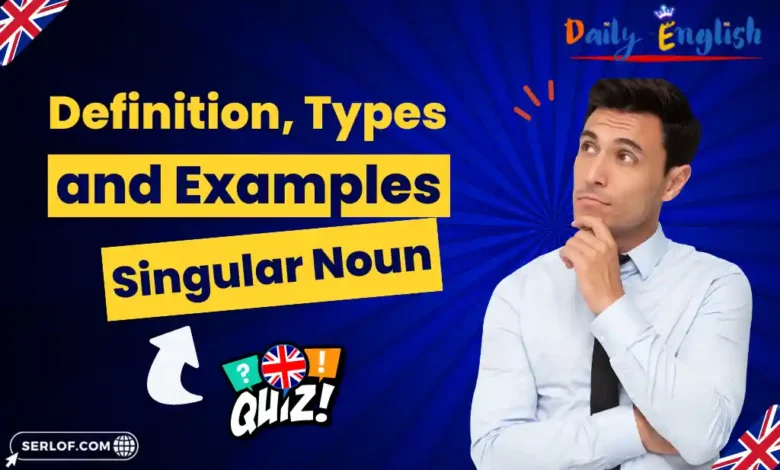Learn English
Definition, Types, and Examples of Singular Noun

Definition, Types, and Examples of Singular Noun
Test in a Singular Noun
Conclusion
Summary of Key Points About Singular Nouns
Summary of Key Points About Singular Nouns
In linguistics, a singular noun refers to just one person, place, thing, or idea. Understanding the characteristics of singular nouns is essential for mastering grammar rules in any language.
When it comes to singular nouns, there are a few key points to keep in mind:
- Definition and Usage – Singular nouns represent one entity and are used in sentences as the subject, object, or complement.
- Plurals vs. Singulars – Singular nouns differ from plural nouns, which represent more than one entity. Adding “-s” or “-es” to a singular noun typically forms the plural.
- Determiners – Singular nouns often require determiners like “a,” “an,” or “the” before them in a sentence to specify which entity is being referred to.
- Countable vs. Uncountable – Singular nouns can be countable (e.g., “book,” “tree”) or uncountable (e.g., “water,” “music”) depending on whether they can be quantified.
- Subject-Verb Agreement – Singular nouns must agree with singular verbs in a sentence to ensure grammatical correctness and clarity.
Mastering the usage of singular nouns is crucial for effective communication and writing in any language. By remembering these key points, individuals can enhance their language skills and improve their overall linguistic proficiency.
Follow us on Facebook : HERE
Follow us on Telegram : HERE
More articles about learning English grammar
- Understanding common nouns, their rules, and examples
- proper noun definition & examples
- Definition, Types, and Examples of Adverbial Clauses
- Definition, Types, and Examples of Adverbial Material Noun
- Definition, Types, and Examples of Abstract Noun
- Definition, Types, and Examples of Collective Nouns
- Definition, Types, and Examples of Compound Nouns
- Definition, Types, and Examples of Singular Noun
- Definition, Types, and Examples of Plural Noun
- Definition, Types, and Examples of Personal Pronouns
- Definition, Types, and Examples of Indefinite Pronouns
- Definition, Types, and Examples of Interrogative Pronouns
- Predicate: Definition, Types & Examples
- “Understanding the Uses of the Preposition “In
- Definition, Types, and Examples of Imperative Sentences
- Definition, Types, and Examples of Exclamatory Sentences
Table of Contents








I really enjoyed reading this topic and everything about it is crucial to me and the rest so I would like to know more.
I love the learning because it’s interesting to learn english is very important to our day to day decision in life we can do without english
Now I ve been avoided unless I only
South Sudan
Anyone that’s speaking English language in any where with conviction that he or she is on the right track in English language speaking, must have been masterd the use of singular noun and other English grammar components convisnlngly .